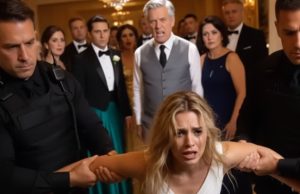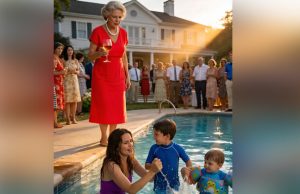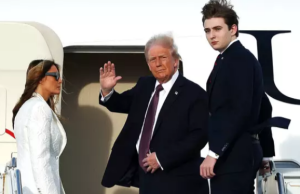Michelle Obama described how the media and public’s ‘fascination’ with the innocuous body was used as a tool to ‘otherize’ her
The former First Lady has opened up about how one specific body part of hers was ‘weaponised’ against her by the media and critics alike.
In spite of being hailed as one of the most popular First Ladies of all time – alongside her husband, Barack Obama, who was in office between 2009 to 2017 – she came under an avalanche of cruel comments, online trolling and baseless speculative theories during her time in the White House.
Michelle, 61 years old, has actually discussed the impact of such treatment in her new fashion photo book, The Look, which was just released this week.
In the new book, Michelle shared about the many different aspects of her personal style and about how she leveraged fashion to shine a light on causes she deemed most important, including education, military families and children’s health.
Also, she candidly opened up about how the press’s response to certain ensembles she’d wear, specifically ones which showed *shock horror* her arms, affected her.

One look she donned when accompanying Barack to his first address to a joint session seemed to really send critics into a spiral, with them claiming it was ‘too informal’, ‘inappropriate’ and ‘out of season’.
Other notable headlines included ‘Up In Arms’ as well as ‘Sleevegate’.
Michelle aptly pointed out that previous first ladies, like Jacqueline Kennedy, had worn sleeveless dresses before – but noted that their take on the silhouette never led to what she described as an ‘uproar’, noting that the media and public’s ‘fascination’ with her bare arms was used as a tool to ‘otherize’ her.
“While I am certainly not the only First Lady to get scrutinised – Hillary was constantly dinged for her preference for pantsuits, and Nancy Reagan was lambasted for her love of haute couture – this felt different,” she wrote.
“Barack and I were being portrayed as Black people who didn’t understand the ‘rules’ of the rarefied world we had found ourselves in and were not unequivocally welcomed into.”
Unfortunately, this was just among many incidents where her style choices were deemed to be ‘un-first lady-like’, Michelle writes.

Back in 2009, during on a trip to the Grand Canyon to highlight the country’s national parks, Michelle chose shorts, a tank top, an oversized shirt and hiking trainers – a fit she felt appropriate for both the rugged terrain and hot weather.
Yet, it’s clear some media outlets took major issue with the, frankly, completely A-OK get-up.
The Washington Post fashion reporter Robin Givhan called the attire ‘common’ in an article which Michelle said she ‘found particularly painful’.
“I’d grown to expect this kind of commentary from men and political opponents, but it was upsetting to me that a fellow Black woman would contribute to the pile-on,” she said. “We were seven months into a brand-new administration, and I was the first Black First Lady trying to find my way.”
Additionally, the mother of two mentioned how she had to be careful with her facial expressions after stepping into the public-facing role.

“I was shocked when our communications team shared notes, rather sheepishly, that I should be careful of my tone and facial expressions, because my passion and humour could be weaponised against me,” she recalled.
“I can’t remember the first instance I was described as ‘angry’ by the press, only that it was often enough that articles and academic papers have since been written about the phenomenon.
“While I intellectually understood how that ‘angry Black woman’ trope could be used against me – and frankly, why Black women should be angry – in these instances, I was simply speaking my truth.”
















